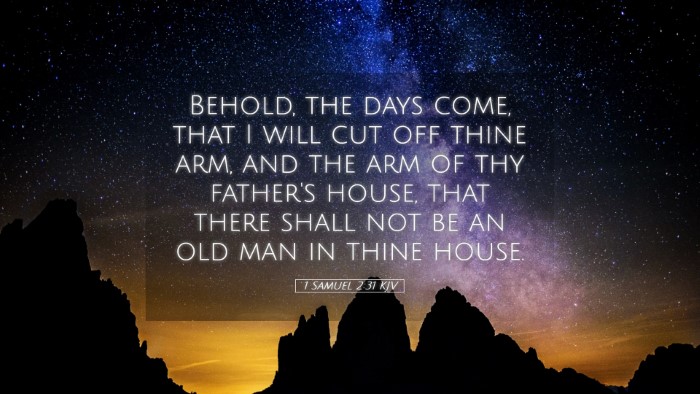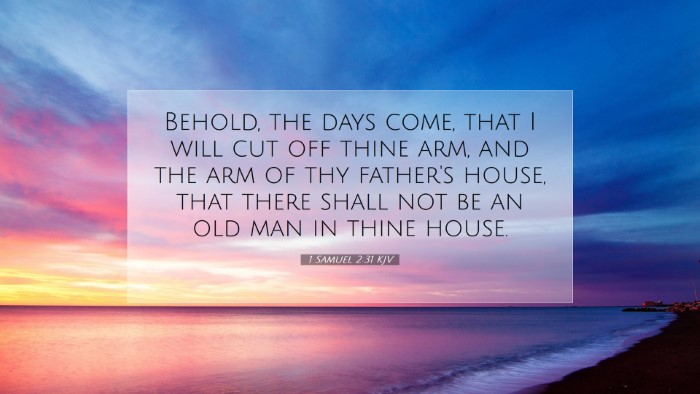Commentary on 1 Samuel 2:31
Text of the Verse: "Behold, the days come, that I will cut off thine arm, and the arm of thy father's house, that there shall not be an old man in thine house."
Introduction
This verse occurs in a significant context concerning Eli and his family, specifically relating to the prophecy of judgment upon them due to their unfaithfulness and misuse of their priestly responsibilities. This commentary draws from key insights of Matthew Henry, Albert Barnes, and Adam Clarke.
Analysis of the Verse
Contextual Background
Henry emphasizes the necessity of understanding the preceding events that led to this prophecy. Eli, the high priest, has failed to restrain his sons, Hophni and Phinehas, who have committed grievous sins in their service and have brought dishonor to God’s name.
The Significance of “Cut Off Thine Arm”
Albert Barnes discusses the metaphor of “cutting off the arm,” which signifies the loss of strength, power, and capability. The phrase illustrates the totality of the judgment coming upon Eli’s lineage; the priestly authority will be stripped entirely from him and his descendants. The “arm” represents both physical strength and spiritual authority.
Generational Consequences
Adam Clarke points out the generational aspect of this curse - the phrase “there shall not be an old man in thine house” indicates that Eli’s family would face a premature end due to divine judgment. This stark warning serves to highlight the seriousness of sin, particularly in leadership positions within the community of faith.
Theological Implications
Divine Judgment and Mercy
Henry reflects on the balance of God’s justice and mercy. While God is just and must punish sin, He also provides a way for restoration. Eli's inability to manage his household comes as a severe warning to those in spiritual authority. Leaders are often held to a higher standard, and their failures can have cascading effects on future generations.
The Role of the Priesthood
Barnes elaborates on the priestly role in Israel. The priests were not merely religious figures; their lives and actions were meant to represent the covenant relationship between God and His people. The prophecy signifies God’s rejection of Eli's house as leaders, thus indicating a transition in how God would interact with the nation.
Application for Today’s Church
This passage urges contemporary church leaders to reflect on their spiritual integrity and accountability. As Henry notes, neglecting one’s calling and the responsibilities associated with it could have grave consequences not just for the individual but for the wider community. Pastors, teachers, and church leaders must live a life that aligns with their teachings.
A Call for Vigilance
Clarke asserts that this incident must serve as a wake-up call for ministers today. Those in leadership should heed this warning and remain vigilant against complacency, moral laxity, and the potential consequences of allowing personal sin to fester.
Hope for Restoration
Even within the stern warnings, there exists an undertone of hope. God’s acts of judgment are ultimately meant to call His people back to righteousness. Barnes reminds readers that while Eli’s family faces judgment, God’s overarching plan continues, leading to the establishment of a faithful line through Samuel.
Conclusion
In summary, 1 Samuel 2:31 serves as a solemn reminder of the seriousness of sin in spiritual leadership and the inevitable consequences that follow. It invites both individual reflection and communal application, encouraging church leaders to seek continuous alignment with God's will while embracing a life of integrity and faithful service. The insights from Henry, Barnes, and Clarke compel us to recognize the necessity for accountability and the opportunity for repentance.


